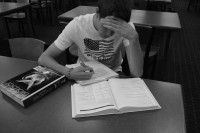District 95 is taking the next step on integrating social and emotional learning into the classrooms by adding fifteen teachers from the elementary, middle, and high school to the Social and Emotional Learning Committee.
According to the NationalCenter for Education Statistics, during the 2009-2010 school years, 39 percent of public schools had to take one serious form of disciplinary action and 29 percent of those schools reported physical attacks. Statistics like these have helped put an emphasis on how important a person’s social and emotional wellbeing can impact their daily life, including school and a career.
Social and emotional learning (SEL) is meant to help teach students the necessary skills to manage and handle their emotions in a healthy way.
“There’s a lot of current research that says that students’ social and emotional intelligence or skills are a potential greater indicator of their future success than their academic skills. I think as a school, we’re sending the message to kids that our job here is to prepare them for all their future endeavors,” Melissa Pikul, dean of students, said. “The committee is trying to figure out how we can explicitly teach all the social and emotional skills [necessary], along with the other academic skills.”
The SEL committee is using the Collaborative for Academic, Social, and Emotional Learning (CASEL) method to develop ways to teach those essential skills. The CASEL program focuses on five points which they found were essential for students to learn: self-awareness, self-management, social awareness, relationship skills, and responsible decision making.
Social and emotional skills are the most effective on a student if the student is introduce to the learning in kindergarten until graduation. Having SEL starting in kindergarten is what Pikul and the committee hopes will be adapted into the school system.
Pikul says research shows kids who have explicit SEL starting in kindergarten are the most successful, but it is never too late to learn social and emotional skills.
“It teaches [students] how to set and achieve goals and how to persist in the face of challenges,” according to CASEL’s website. “SEL helps students become good communicators, cooperative members of a team, effective leaders, and caring, concerned members of their communities.”
Pikul agrees that having social and emotional skills is important in a person’s life during their school years, but also later in their career.
“[SEL is] really important because you can have all the academic skills in the world, but if you’re not socially and emotionally strong, those skills will never translate into a successful career opportunity,” Pikul said. “I think the smartest people in the world aren’t necessarily the most successful if they don’t have those people skills and social skills.”
The SEL committee is now reaching their next step on integrating SEL into the school system: creating awareness among the staff.
“[The committee] wants to include teachers so they can help [us] develop different ways on not only how to train the staff on social and emotional learning, but get it to the students,” Pikul said. “The purpose of [adding teachers] is to make the committee more effective.”
Justine Repplinger, math teacher, is one of the two teacher representatives from the high school on the SEL committee, along with Michelle Levin, P.E teacher. Repplinger acknowledges how stress can affect a student’s performance inside the classroom.
“We know there [is] a pattern of stresses that happen in the high school for students,” Repplinger said. “Mostly I think it’s a lot of time management issues and feeling overwhelmed, especially if you’re absent a day. Those kinds of things cause a lot of stress.”
Stress can affect a student’s performance inside the classroom as well as outside of the class. As stress continues to build, it is more likely for a student to feel negative towards school.
“We know there is a link between how students feel about school, how students feel about interacting with their peers in their classes and their success,” Repplinger said. “And so we know students do achieve more and learn more when they are emotionally happy and are in a good spot. When you have a lot of negativity, it tends to block learning.”
The committee brainstorms ideas to make the committee more effective. Results from the Illinois Youth Survey have provided the SEL committee with information to figure out where students are at socially and emotionally, according to Pikul.
“It takes a long time for a school system to fully implement a plan [for SEL],” Pikul said. “It’s something that will slowly progress through the next couple of years.”
